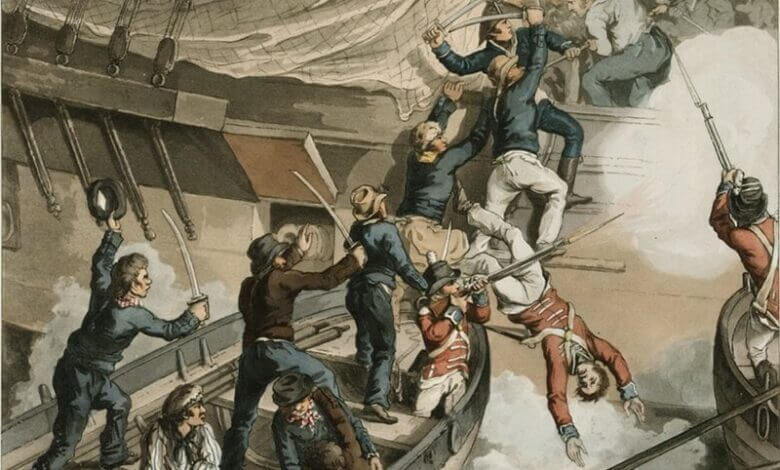What does mutiny mean?

Mutiny refers to an organized revolt or rebellion against established authority, usually in the military or navy, and often resulting in the overthrow of the existing leadership. It is a serious offense that can result in severe punishment, including imprisonment or even death. Throughout history, there have been numerous instances of this, many of which have had far-reaching consequences.
In this article, we will explore the meaning of mutiny, its causes, consequences, and examples, among other related aspects.
Related article:
Why should we use a Flywheel in an Engine
Definition and Origin of Mutiny
Mutiny, as stated earlier, is an organized revolt or rebellion against established authority. The term is derived from the Latin word “mutare,” which means to change. Mutinies can occur in any situation where there is a hierarchical structure, but they are most common in the military and navy.
The origins of this revolt can be traced back to ancient times, where soldiers often rebelled against their superiors due to poor living conditions, low pay, and mistreatment. The history of rebellion is a long and complex one. Throughout history, it has been used as a means of expressing dissatisfaction with the ruling authorities, often in the context of war or rebellion.
While rebellion can occur in any hierarchical structure, it is particularly prevalent in the military and navy, where soldiers and sailors often face harsh living conditions and mistreatment. The term “mutiny” has come to be associated with acts of rebellion and revolution, and it remains a powerful symbol of resistance against established authority.
Related article:
The Ultimate Cfa Level 3 Study Guide
Causes of Mutiny
Its causes can occur due to various reasons, including dissatisfaction with leadership, poor living conditions, low pay, mistreatment, and abuse of power. In the military, mutinies are often the result of poor leadership or inadequate supplies and equipment. In some cases, it can also be caused by ideological differences or conflicting loyalties.
Here are a few worth mentioning causes:
Dissatisfaction with Leadership:
One of the primary causes of rebellion is dissatisfaction with leadership. This can occur when military personnel feel that their leaders are not competent, are not providing adequate support, or are not listening to their concerns. Poor leadership can erode morale and trust, leading to a breakdown in the chain of command and making it more likely.
Poor Living Conditions:
Another common cause of mutiny is poor living conditions. In the military, soldiers and sailors often live in cramped, unsanitary conditions with little privacy or comfort. These conditions can lead to health problems, stress, and other issues that can impact their ability to perform their duties. When soldiers feel that their living conditions are unbearable, they may rebel against their superiors as a means of expressing their discontent.
Related article:
What are the Symptoms of Asbestos?
Low Pay:
Low pay is another factor that can contribute to it. Military personnel are often paid very little, particularly when compared to the risks and sacrifices they make on a daily basis. When soldiers feel that they are not being adequately compensated for their work, they may become resentful and feel undervalued. This can lead to a breakdown in morale and motivation, making it more likely.
Mistreatment:
Mistreatment is another factor that can contribute to mutiny. Military personnel may be mistreated in various ways, including physical abuse, verbal abuse, or harassment. When soldiers feel that they are being mistreated, they may become angry and feel that their leaders are not treating them with the respect they deserve. This can lead to a breakdown in trust and respect, making rebellionship more likely.
Abuse of Power:
Abuse of power is another factor that can contribute to mutiny. Military leaders may abuse their power in various ways, including by using excessive force, engaging in corrupt practices, or imposing unjust rules or regulations. When soldiers feel that their leaders are abusing their power, they may become resentful and feel that their rights are being violated. This can lead to a breakdown in trust and respect, making this more likely.
Types of Mutiny
Mutiny can be classified into various types, depending on the nature of the revolt and the individuals involved. One of the most common types is a “palace coup,” where a group of military officers overthrow the existing leadership and take control of the government. Other types include “soldier’s revolt,” “sailor’s mutiny,” and “officer’s mutiny.”
Related article:
What Personal Injury Lawyers do? Everything you need to know
Consequences of Mutiny
Mutiny can have far-reaching consequences, both for the individuals involved and the wider society. In the military, this can lead to the collapse of the chain of command and compromise the effectiveness of the armed forces.
This feeling of rebellion can also lead to widespread violence and chaos, endangering the lives of civilians and military personnel. In addition, mutineers can face severe punishment, including imprisonment or even death.
Famous Examples of Mutiny
Throughout history, there have been numerous examples of mutiny, some of which have had far-reaching consequences. One of the most famous mutinies occurred on the HMS Bounty in 1789, where a group of sailors rebelled against their captain, William Bligh.
Related article:
What is Astronomy | A Complete Guide
The rebellion resulted in the death of several crew members and the exile of Bligh. Another famous mutiny occurred in 1857, during the Indian Rebellion against British rule. Indian soldiers rebelled against their British officers, leading to a brutal crackdown by the British authorities.
How to Prevent It?
Preventing mutiny requires effective leadership, good communication, and addressing the root causes of dissatisfaction among military personnel. Leaders must be able to identify potential mutineers and address their concerns before they escalate into full-blown revolts. Providing adequate supplies, equipment, and living conditions can also help prevent it by ensuring that military personnel are satisfied with their situation.
One of the most important factors in preventing mutiny is effective leadership. They must be willing to listen to feedback and take action to address any issues that arise. Leaders who are seen as fair and just are more likely to have the respect and loyalty of their subordinates, which can help prevent it.
Good communication is also essential in preventing it. Leaders must be able to communicate their expectations clearly and effectively, while also being open to feedback and suggestions from their subordinates. Clear communication can help prevent misunderstandings and ensure that everyone is on the same page. Leaders who are open and transparent with their subordinates are more likely to build trust and respect, which can help prevent it.
Related article:
Top Reasons to Study at American Public University
To prevent mutiny, it is also important to address the root causes of dissatisfaction among military personnel. This may include providing better living conditions, addressing issues of mistreatment or abuse of power, and ensuring that military personnel are adequately compensated for their work. By addressing these underlying issues, leaders can help prevent feelings of frustration and resentment from boiling over into mutiny.
Another important tool in preventing mutiny is training and education. Leaders must be trained to identify potential mutineers and address their concerns before they escalate into full-blown revolts. Military personnel must also be trained to understand the importance of following orders and the consequences of rebellion. By providing training and education, leaders can help prevent it by ensuring that everyone is aware of their responsibilities and the potential consequences of their actions.
Final Verdict!
Mutiny is a serious offense that can have far-reaching consequences. It can be caused by a variety of factors, including poor leadership, mistreatment, and abuse of power. Preventing it requires effective leadership, good communication, and addressing the root causes of dissatisfaction among military personnel. By understanding the causes and consequences of rebellion, leaders can take proactive steps to prevent it from occurring and ensure the stability and effectiveness of the armed forces.






